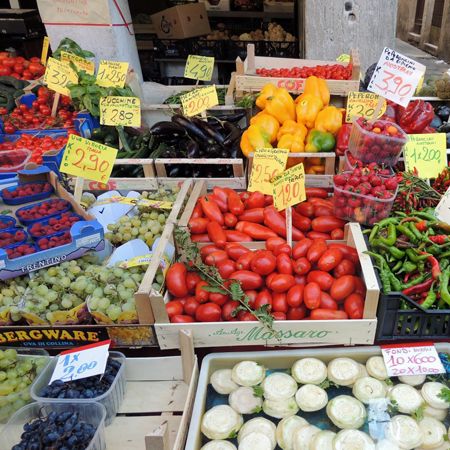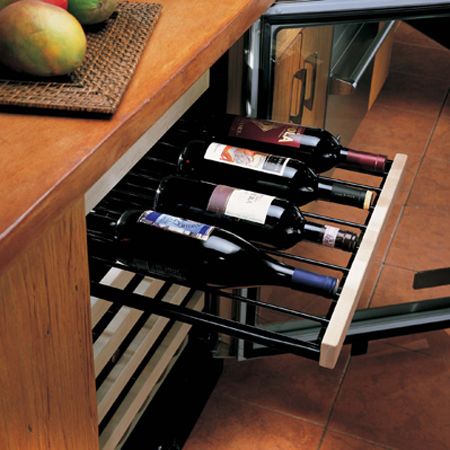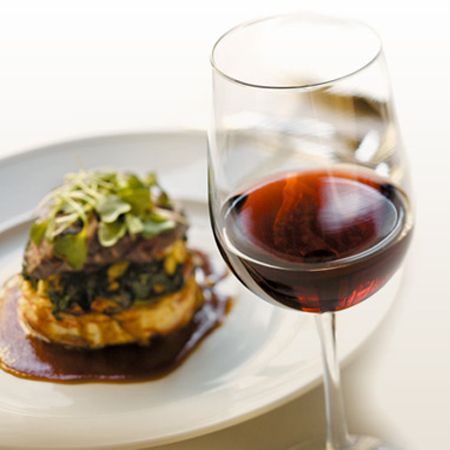A Visit to an Italian Farmers' Market

To market, to market. That’s where we go every Monday morning down in the piazza below the village. It’s filled with cars every other day of the week, but on Monday mornings it’s the sight of Loro Ciuffenna’s bustling weekly market. It has been held on a Monday morning for as long as anyone can remember, and in these parts the vast common memory stretches back for centuries. Farmer families used to walk down from the mountain hamlets with their goods for sale: chickens, eggs, pigs, sheep, seasonal fruits and vegetables.
That’s how Piero kept up with everyone and their business. His house is along the road leading from the mountain into the village, and everyone stopped by for a chat or a coffee, or to get out of the rain if that was an issue. Now everyone drives by in cars, rain or no rain, and the mountain has been de-populated a bit. So traffic on the mountain road has tapered off and many of the goods come from further afield (meaning from Laterina, all of 20 minutes away).
The concept of the market remains the same. The idea is you can live in the teensy village and never, ever, leave. You can stock up on regular types of things during the week in any of our three or four shops. If you need something out of the ordinary, there’s no need to drive down into the valley (or get a ride from a grandkid) – just wait for Monday and it’ll come to you. Think of it: candy, fish, cheese, porchetta (mmmm, whole roast piglet), chickens (I mean the live kind), seedlings (you could plant an orchard, vineyard or olive grove from what you find at the market), underwear, kitchen gear, umbrellas, plus produce and semi-large agricultural machinery – both of which change with the seasons. Underwear: check. Artichokes: check. Chainsaw: check.
The social system of the market is a miniature version of the village’s system. Women work, men chat. In the village you see the women out shopping, going from green grocer to butcher, baker to alimentari. You see them as they work to get their homes squeaky clean, swabbing the stoop and the street itself out front; shaking everything that’s not nailed down out the window for a little airing out; adjusting the clothes drying on the lines strung between windows, fitted with pulleys and visqueen to protect from raindrops and pigeons. The men (retirees and a few lazy bones) are generally huddled into or in front of one of Loro’s three coffee bars. It’s here that they inform themselves about Formula Uno racing, other sports, last week’s runaway bride or local political matters. It doesn’t hurt to be informed, so Piero (since not many folks amble by his front door anymore) pops into one of the bars (on a rotating basis) every morning for a coffee and a little gossip, and then hightails it back to the sanity of the farm.
On Mondays the men relocate their huddle to the spot in front of the agricultural machinery stand. Real live farmers have to elbow their way through the knot of gossipers (one ear cocked for an interesting tidbit) to inspect the latest technology for grape pressing or olive picking. It’s the women who vie for position in the line at the farmer’s stand, haggle over pears and bitter greens, and paw through busily patterned table linens, cooking utensils, pots and pans.
I mostly go for fresh vegetables, but I’ve never figured out why one stand has a good 95% of the customers and the other (we have all of two fruit and vegetable stands) looks so lonesome. I pick the Laterina farmers over the other because of the crowds, presuming fresh vegetables they must have better stuff. I stick with them in the interest of establishing the all important rapporto di fiducia (faith/trust relationship). Once a vendor knows you, they usually give you the pick of the crop, a discount or special order stuff – that type of thing. So I put up with the wait and deal with all the old ladies trying to break in line. I give them a polite, yet forceful, Tocca a me, which means “it touches me” (their way of saying it’s my turn), and make a little small talk with the slightly obsequious vendors by complimenting their goods and such. All that Laterina farmer bagging apricots and those sneaky Laterina farmers never really return my fiducia. In fact, I get the feeling they try to push what they need to sell over what I actually want, vaunt the beauty and tastiness of their crops just a little too exuberantly, and ask about my mother not because they care, but in hopes of gaining my undying loyalty. I notice they always give me more than I ask for. Ask for three peaches and he’ll try to give you three kilograms; she goes a little easier, but always tosses in a few too many. They’re skimpy on the free odori (odors: carrot, celery, parsley), and I wonder about the math, which is done on the back of a paper bag after a quick lick of the pencil tip, although I’ve never had the nerve to question them on it.
Recently I noticed the lonely stand just across the piazza had some really nice looking greens. So off I went, betraying those sly Laterina farmers. I actually hid my face, did my best to sidle up to the heavily-laden table unnoticed by the busy competitors a mere ten meters away, bought some greens and slipped out. I think I pulled it off. The greens were really good, too. Maybe it’s time to get it over with and make the switch once and for all. Maybe the sly Laterina farmers won’t notice. But why do I care? What are they going to do? Heckle me, and toss pieces of overly ripe fruit?
This is the best expression of early spring on a plate that I know of. I use new spring green asparagus, bacelli (fava beans), and the last of the season’s artichokes. It’s best made with some super tasty extra virgin olive oil, aromatic freshly ground pepper, and homemade or artisan pasta. Artisan pasta made with high-quality hard wheat is dried at a low temperature, ensuring that the gluten remains active so that it retains a heavenly texture and flavor. And don’t think I forgot to mention the cheese. This pasta doesn’t need cheese; oil and pepper are more than enough of a match for the vegetables.


